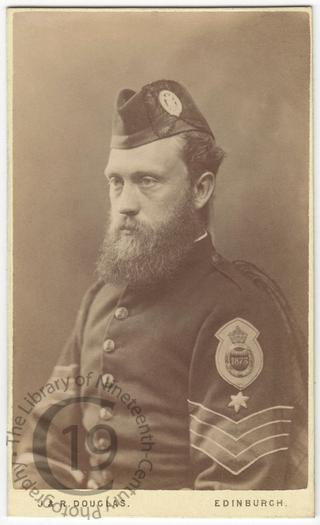
Sergeant Archibald Menzies
A carte-de-visite portrait of Sergeant Archibald Menzies of the Queen's Edinburgh Rifles who in 1873 won the Queen’s Prize at the National Rifle Meeting of volunteers held annually in Wimbledon. The prize was worth £250.
According to some newspaper reports, Sergeant Menzies was 'a law student [...] serving articles with his brothers, who are solicitors to the Supreme Court of Scotland' (Birmingham Daily Post, 16 July 1873).
However, a lengthy account of the competition in the Edinburgh Evening News (16 July 1873) reported his profession as 'writer.'
'For the fifth time, as opposed to nine times for England, her Majesty's Prize has fallen to Scotland. The winner of the gold medal and the purse of 250 sovereigns is Sergeant Archibald Menzies, of the 2d Highland Company, Queen's Edinburgh Rifle Brigade, who scored an aggregate of 60 points, beating the next two names on the list by the narrow majority of one. To-day was extremely wet and boisterous, a circumstance which accounts sufficiently for the winning score being considerably under the average of previous years. [...] He is a native of Weem, near Aberfeldy, Perthshire, and is by profession a writer. His brothers, Captain Robert Menzies of Edinburgh, and Captain James Menzies of the 105th Glasgow Highland Regiment, are well known shots and enthusiastic members of the volunteer force, and this high honour which has fallen to the family will give great satisfaction. [...] It is intended to assemble the Queen's Edinburgh Brigade on Monday evening next, and march to Waverley Station, there to receive Sergeant Menzies when he arrives from the scene of his triumph.'
He died, aged 68, on 5 February 1914 at his residence, 12 Mentone Terrace, Edinburgh. A lengthy obituary appeared in The Scotsman (7 February 1914). 'Born at Weem, near Aberfeldy, sixty-eight years ago, Mr Menzies came early in life to Edinburgh. He began his career as a pupil teacher in Edinburgh, but afterwards entered the profession of the law, and in 1879 was admitted a member of the Socieity of Solicitors before the Supreme Courts. As a Volunteer and marksman Mr Menzies came prominently before the public. He was associated with the movement from early days, and throughout the greater part of his life he was closely identified with every phase of the citizen army, in which he took the keenest interest.' The obituary includes an account of his win at Wimbledon in 1873. He had, apparently, not intended to enter the competition and had only taken his younger brother's place at the last moment when his brother was unable to attend the meeting. 'On several succeeding years Sergeant Menzies visited Wimbledon, but he never repeated the success of his first visit, nor did he, indeed, ever reach the final stage.' A fluent speaker in Gaelic, he was a zealous member of the Executive Council, whose object was 'the preservation and encouragement of the Gaelic language, and also Highland music and home industries. It was in the musical side of the Gaelic revival that Mr Menzies was most interested. He had strong musical talent, and deploring the fact that the national music was not receiving the attention it should, he, along with some associates, founded the Highland Reel and Strathspey Society, with the object of fostering and preserving the national airs of Scotland.' At the time of his death, he was the society's conductor. He was also a member of the Edinburgh Pen and Pencil Club and 'an ardent Freemason.' His recreations included angling, 'of which he was a keen devotee.' The obituary concludes: 'Of a warm-hearted, kindly, and genial disposition, Mr Menzies will be mourned by a wide circle of friends. He is survived by his wife, four sons, and a daughter.'
Photographed by J. and R. Douglas of Edinburgh.
Code: 127642




